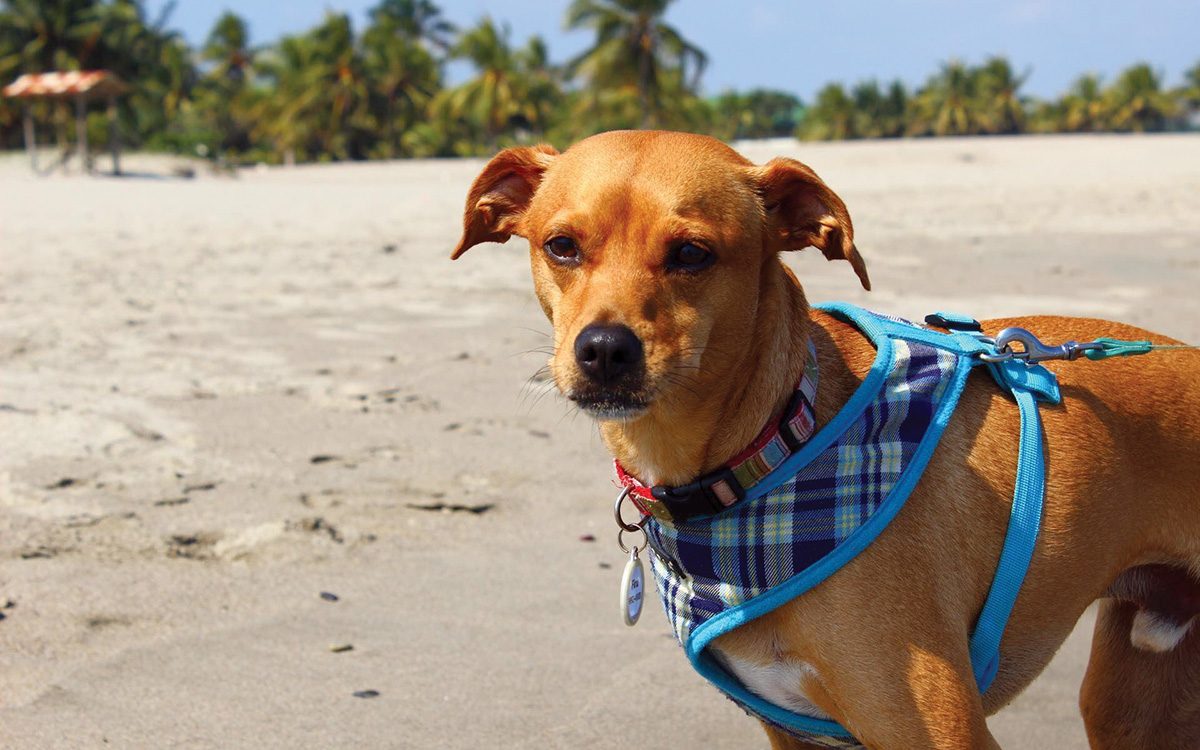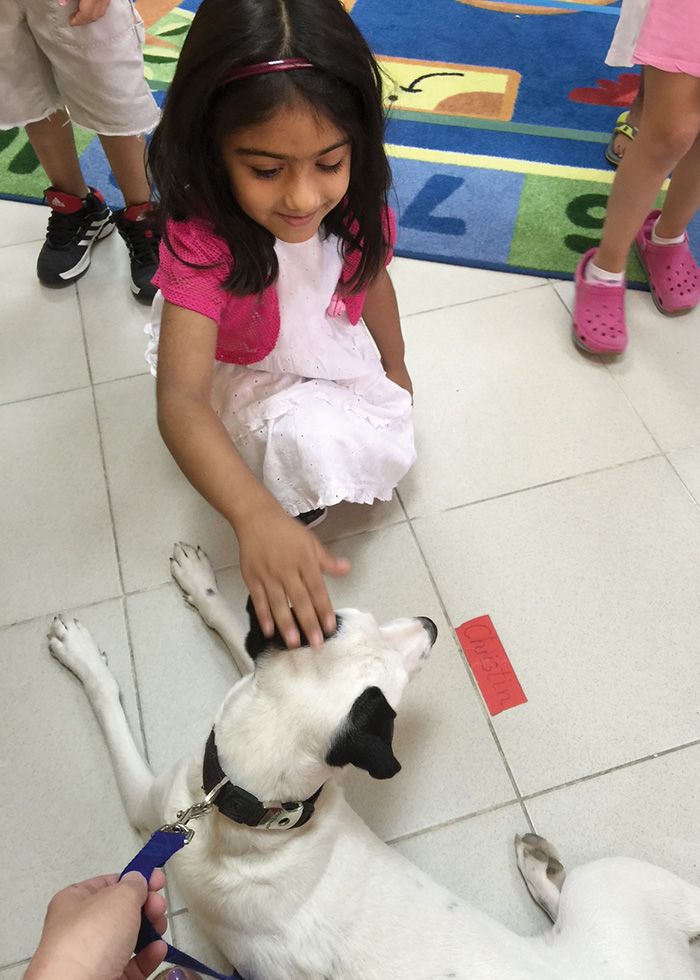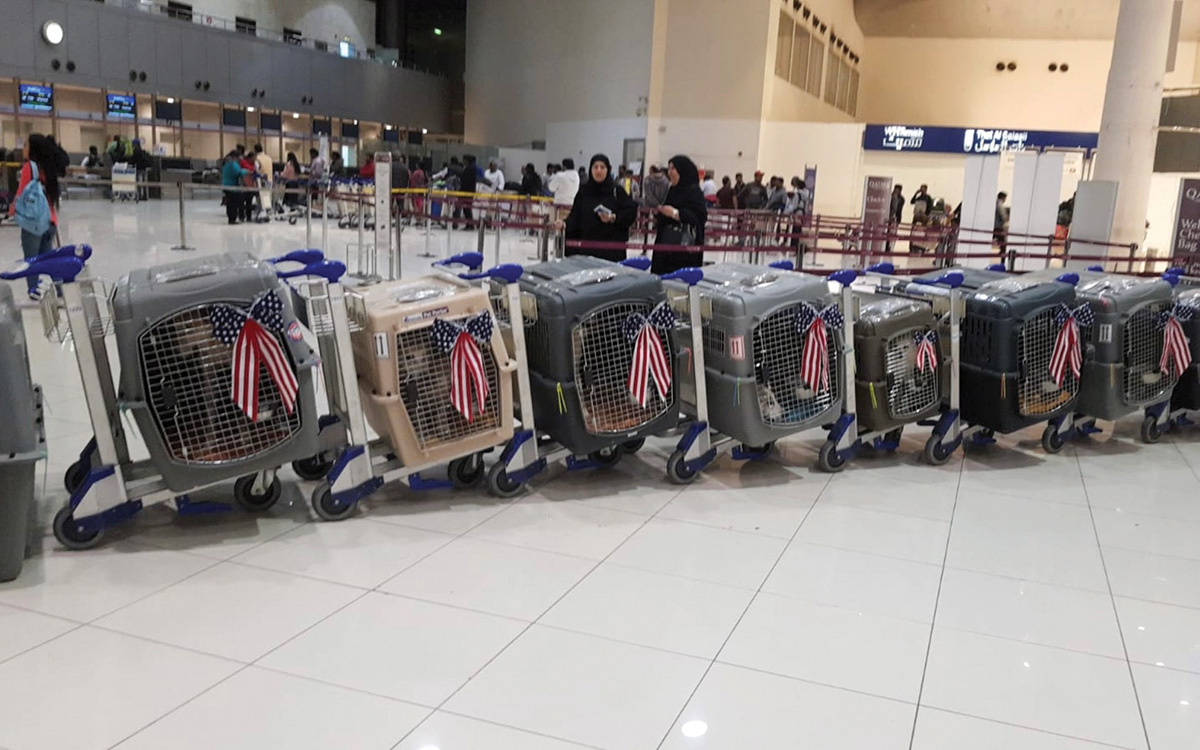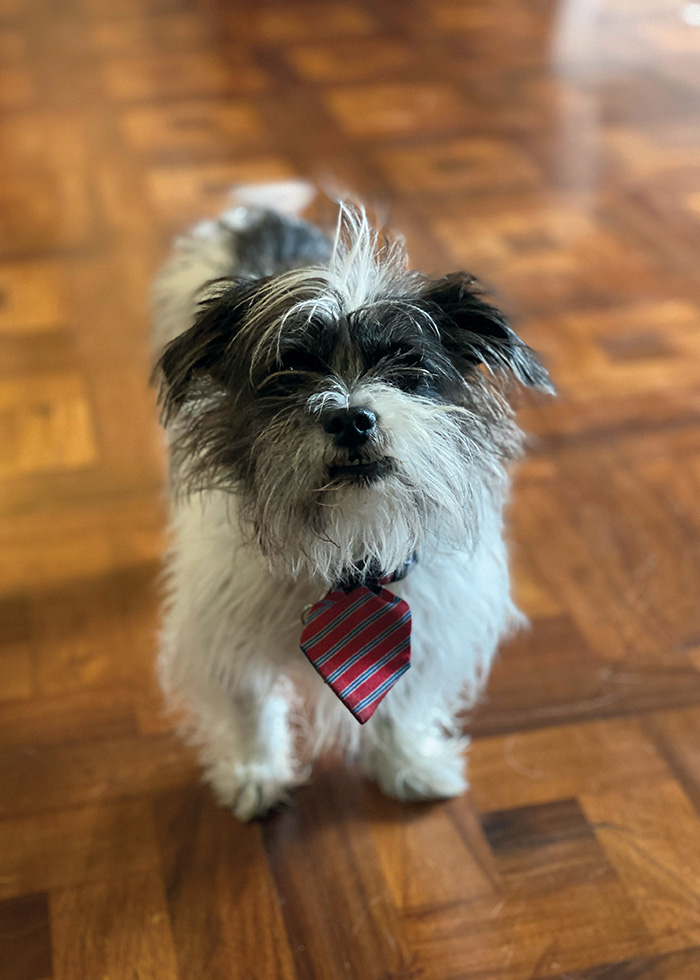Flying with Fido
Taking your family pet home just got a lot harder. Here is what you need to know.
BY MELISSA MATHEWS

Firu has lived with Heather Harper-Troje and family in Honduras and Costa Rica. Now 12, he is semiretired in Miami.

The author’s dog, Evie, conducts doggie diplomacy at a school in Saudi Arabia, where many children aren’t familiar with how to interact with dogs as pets.
When the Heidemann family moved to the Philippines in the summer of 2019, they settled in with their family: four sons and a 10-pound terrier mix named Winston. “He’s been a stabilizing force for our children during the transitions of Foreign Service life,” says mom Galia.
When the pandemic hit, the children endured grueling lockdowns. It was traumatic, says Galia, but Winston “was an emotional support for our entire home.”
Now, Winston’s future is uncertain. Like many Foreign Service families, the Heidemanns are scrambling to figure out what to do after the U.S. Centers for Disease Control and Prevention implemented a ban on dogs coming into the United States. That could force some hard choices.
The policy, announced June 14, effectively bans the import of dogs from more than 100 countries the CDC identifies as high risk for rabies. That means dogs at many posts may not have an easy time getting home. The policy went into effect in July, and a partial grace period ends in October. The CDC subsequently announced a limited permit program with stringent requirements that many say are difficult or impossible to fulfill.
Struggles with the Permit Process
When the CDC announced the ban, most Americans hardly noticed. But for military personnel, diplomats and private U.S. citizens who live abroad with their pets, the announcement hit home.
In most cases, the CDC’s permit program requires a rabies titer test, performed within a year of travel. Initially, the CDC approved only four labs globally for the test.
Kateri Clement was working in Liberia for the Millennium Challenge Corporation, a U.S. foreign aid agency, but left post early with her dogs, Togo and Lawali, to beat the ban. In parts of Africa, commercial shippers do not permit the transport of fresh blood required for the titer test, she says. The only way to get it to the nearest approved lab is to hand-carry it—and pay thousands in travel and lab costs. “This would be an incredible burden for people like me who live in lesser developed countries,” she says. “It is next to impossible for anyone serving in West Africa to comply with the new rules.”
After advocacy from AFSA and an outcry from those affected, CDC approved more labs, but not enough to address the limitations of many posts.
A retired Foreign Service officer doing an assignment in Central Asia brought her labradoodle along, a decision she now regrets. “With this kind of treatment from the government, I certainly will not be interested in filling future staffing gaps,” she says.

A line of dogs at Kuwait International Airport get ready to fly to the United States on July 12 ahead of the CDC ban. Since 2015, the nonprofit group Wings of Love Kuwait has been rescuing abandoned dogs from Kuwait and bringing them to Maryland for adoption.
Confusion at the Airlines
The CDC initially said all dogs with a permit had to arrive through only one port of entry: JFK Airport in New York. The Fly America Act, combined with limited flight options during the pandemic, left many without a route into JFK. The CDC has since added a few additional ports of entry. Notably, Dulles Airport in Washington is not on the list. Some airlines, such as American, announced that they would stop flying pets to the U.S. at all—whether or not they were covered by the ban; other global airlines canceled tickets and pet reservations.
A family retiring from military service tried to get two cats out of Germany. “The ban applies to dogs and doesn’t apply to Germany … but it’s easier for the airlines to apply a blanket ban on all pets headed to the United States,” says the retiring U.S. Army colonel. Instead of shipping the cats economically as accompanied baggage, the family had to pivot to more expensive cargo. “What should cost us $300 will now cost us upward of $5,000. Happy retirement to us, I guess.”
Making Hard-to-Fill Posts Harder to Fill

Winston, a terrier mix, was a perfect gentleman during months of pandemic lockdowns in the Philippines. But a dog import ban from the CDC has the Heidemann family worried about how he'll get home.
After a year and a half of COVID-19 stressors, some U.S. government personnel say navigating the CDC ban may be their breaking point. One Foreign Service specialist in a high differential post says she has already curtailed. She won’t be the only one letting the ban influence where she is willing to serve.
“Long term, this policy will require that I avoid bidding on positions among the 113 countries covered by this ban,” says an officer moving to North Africa. His family made the difficult decision to leave their dog behind in the United States for now “because of the uncertainty the CDC has created for us.”
“Going into bidding season, the ban is certainly making my family rethink our plans to serve again overseas,” says a Foreign Service officer currently in the Middle East. “We’ve done nothing but hardship tours my entire career. I’m not sure that’s feasible anymore.”
The CDC Responds
Dr. Emily Pieracci, zoonoses team lead in the CDC’s Quarantine and Border Health Services Branch, says the agency is working on a longer-term solution. But in the meantime, she adds: “We have worked diligently to identify a temporary course of action that will simultaneously reduce the risk of importing a rabid dog, protect the health and safety of animals during and after travel, and allow USG personnel who are serving our country overseas to import their dogs into the United States.”
The CDC’s Federal Register notice, posted in July, cites three incidents of rabies-positive dogs imported by rescue groups over six years, and a more recent uptick in problematic import paperwork. While personal pets were not involved in the rabies cases, Dr. Pieracci suggests there have been cases of suspicious or incomplete paperwork with government personnel. She did not provide specifics.
The agency says overseas Americans should maintain up-to-date vaccines and titer tests annually to speed the permit process in the event of an evacuation or medical emergency. “CDC works with DOS and DOD when these kinds of emergencies arise and will handle these situations on a case-by-case basis,” a spokesman says. At this writing, however, there is no expedited permit process available on the CDC website, nor any appeals process if a permit or entry is denied. Under the policy, the airline—not the pet owner—must take possession of dogs denied entry and quickly deport them.
The Foreign Affairs Community Pushes Back
AFSA says it recognizes the high value its members place on serving alongside their pets. “We have engaged with the CDC director to find ways to make certain these new regulations can be realistically complied with,” says AFSA President Eric Rubin. “We have met with some success … but a general exemption for government employees on official travel orders, at least until after the transfer season, makes the most sense.”
Heather Harper-Troje is part of a grassroots movement to raise awareness of the impacts of the ban. She and others organized—in particular, through the Facebook group Foreign Affairs Friends of Animals Network—and launched a petition that garnered more than 10,000 signatures in just over a week. They also organized outreach to legislators on Capitol Hill and earned media coverage. “If there’s anything we’ve all learned from the Foreign Service life, it’s that we’re stronger together,” she says.
Many in the foreign affairs community say their pets are full-fledged members of the family, and without being confident about getting dogs home from certain posts, they may be unwilling to serve there. With bidding season underway, this should be an urgent concern for the State Department and other agencies, as well.
Read More...
- “Notice of Temporary Suspension of Dogs Entering the United States from Countries Classified as High Risk for Dog Rabies,” by CDC, June 14, 2021
- “The U.S. Bans Importing Dogs From 113 Countries After Rise In False Rabies Records,” by NPR, June 14, 2021
- “Why a New CDC Ban Could Separate U.S. Diplomats Abroad From Their Dogs,” by Robbie Gramer, Foreign Policy, August 4, 2021



